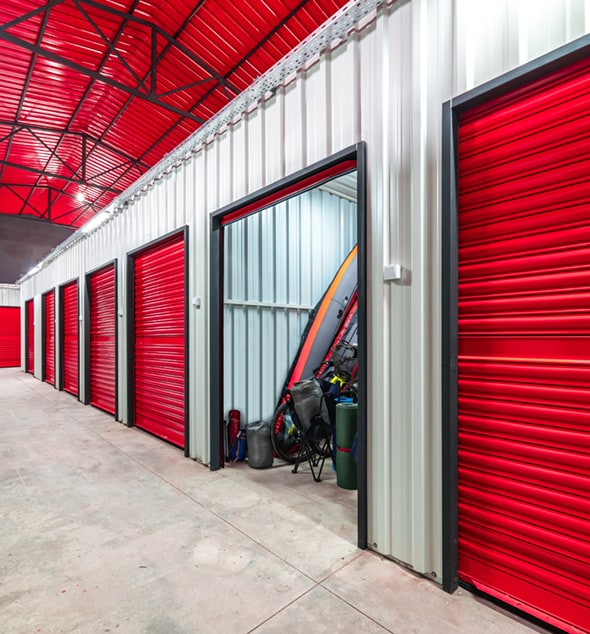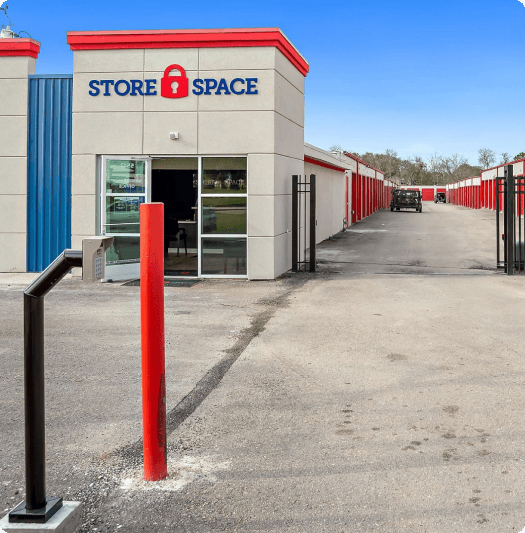Vehicle Winterization and Storage: 6 Tips for Better Protection During the Winter

How exactly should you winterize a vehicle for storage? Is the process for storing an automobile the same as storing a boat?
Well, all of these questions and several others will be answered below. In addition, we will also explore our list of helpful vehicle storage tips, which can be used to store your vehicle at your property or in a self-storage facility, talk a little about preventive vehicle maintenance, and discuss why Store Space is the perfect place to store your vehicle for the winter!
6 Tips For Successful Winter Vehicle Storage:
1. Give Your Vehicle a Good Bath
It is always a good idea to wash the exterior of a vehicle before it is stored for an extended period. Giving your vehicle a good bath will remove dirt and grime from the vehicle’s paint, glass and other components. Make sure when washing an automobile or another complex vehicle to thoroughly clean the undercarriage and other hard-to-reach places.
While waxing and polishing might not be necessary for placing a bicycle in long-term storage, you may want to take those extra steps with a motorcycle. In addition, whether it’s the interior of a car or an RV or boat, it’s important to clean and declutter your vehicle’s interior.
2. Extra Protection
If you are storing at home, your stored vehicle might attract 4-legged visitors looking for a warm place during the winter.
- Effectively erase food spills with a deep clean
- Disperse dryer sheets or heavily scented mothballs throughout your vehicle
- Plug air inlets, exhaust pipes, and other holes with steel wool
- Place mouse traps outside of your vehicle
- Periodically check your vehicle for damage throughout its time in storage
Note: Most self-storage facilities have rodent production in place. However, it is still important to clean your vehicle deeply, disperse dryer sheets, plug air inlets, and so on.
3. Check All Fluids
When working to winterize a car, boat or an RV, it is important to check all of your vehicle’s fluids. Some fluids, like coolant and oil, should in most circumstances be flushed and then topped off. Whereas your vehicle’s gas tank should either be completely emptied and cleaned, or better yet, filled and strengthened with a fuel additive. The best fuel additive for winter vehicle storage is one that is focused on the longevity of your vehicle’s fuel system.
If you live in an area where subzero temperatures are common, then taking care of your boat or RV’s coolant system requires additional precautions. The best course of action here is to fill your vehicle’s coolant system with antifreeze. Make sure this amount of antifreeze is enough to reach all of your vehicle’s coolant channels and hoses to maximize its protection.
4. Protect Batteries

If the vehicle you are protecting is a motorcycle or recreational vehicle, then you can simply remove the battery and store it in a protected place. However, this is not recommended for newer automobiles equipped with engine computers.
In this circumstance, your best option is to hook up your vehicle's battery to a trickle charger or battery tender. When purchasing the charger, look for one that has an auto shut-off feature. This feature will prevent overcharging and further protect the battery.
5. Cover Your Vehicle
Covering your vehicle with a tarp, cloth or plastic sheeting is a good way to prevent dust from entering the vehicle while it is stored. Blanketing a cover over your vehicle also adds an extra layer of protection against rodents and other animals.
Obviously, the size of your cloth or cover will depend upon the size of the vehicle you are storing. However, no matter whether you are storing a boat, a motorcycle or a water scooter, you should make sure the cover you choose fully drapes over the entire vehicle to maximize its protection. If you have a few extra dollars lying around after Christmas shopping, you can even purchase a custom-fitted cover for your vehicle!
6. Store Your Vehicle
To safely store and protect most larger vehicles, many storage facilities offer gated outdoor storage options. These options are great for winter vehicle storage, but extra caution must be taken to properly winterize your vehicle and protect it with a heavy-duty cover!
At Store Space, we have several options to store vehicles. Use our convenient storage location finder to find a vehicle storage solution near you!

FAQs
Q: How much does it cost to store a car for winter?
A: The monthly cost of storage will vary, depending upon factors like location, size and type of self-storage used. Self-storage facilities are often less-expensive than specialized storage locations.
Q: How do you winterize and store a car for the winter?
A: To properly protect your car and store it for the winter, you should follow these steps:
- Wash, clean, and dry your car
- Plug air inlets and exhaust pipes with steel wool
- Add fuel stabilizers, antifreeze, and check all fluids
- Place battery on an auto shut-off trickle charger
- Cover your vehicle
- Place your vehicle in covered storage
Q: Is it OK to store a boat outside in winter?
A: If you decide to store your boat outside you will need to fully winterize the vehicle before temperatures fall below freezing.
Q: Do I need to winterize my RV if stored inside?
A: If you live in a region where temperatures may drop below 32 degrees Fahrenheit, then it is still recommended that you winterize your RV.







